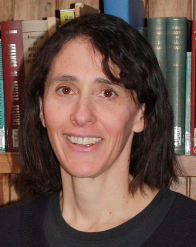梅拉妮·米歇尔Melanie Mitchell
基本信息
| 类别 | 信息 |
|---|---|
| 姓名: | 梅拉妮·米歇尔 Melanie Mitchell |
| 获奖: | Phi Beta Kappa科学奖(2010),赫伯特·西蒙奖(2020) |
| 国籍: | 美国 |
| 母校: | 布朗大学,密歇根大学 |
| 所属机构: | 密西根大学,圣塔菲研究所,洛斯阿拉莫斯国家实验室,OGI科学与工程学院,波特兰州立大学 |
| 联系邮箱: | mm@pdx.edu |
| 主要研究方向: | 复杂系统,遗传算法 |
梅拉妮·米歇尔 Melanie Mitchell,是波特兰州立大学 Portland State University的计算机科学教授。她曾在圣塔菲研究所 Santa Fe Institute和洛斯阿拉莫斯国家实验室 Los Alamos National Laboratory工作。她主要的研究领域在类比推理、复杂系统、遗传算法和元胞自动机。在这些领域中,她所出版的书籍、发表的论文经常被引用。[1]
1990年,她在密歇根大学获得了博士学位,在侯世达和约翰·霍兰德 John Holland的指导下,她开发了模仿的认知结构。也写下了《以类比为知觉 Analogy-Making as Perception》一书,这本书本质上也是关于模仿。她还批评了斯蒂芬·沃尔夫勒姆 Stephen Wolfram所写的《一种新科学 a New Kind of Science》 ,并指出遗传算法能够更好的解决一维元胞自动机的大多数问题。她撰写的《遗传算法导论 Genetic Algorithms》是一本广为人知的介绍性书籍,由麻省理工学院出版社于1996年出版。她也是《复杂性: 导览 Complexity: A Guided Tour》(牛津大学出版社,2009年)一书的作者,该书获得了2010年斐陶斐卡帕科学图书奖,并被亚马逊网站评为2009年十大最佳科学书籍之一。她的最新著作是《人工智能:思考人类指南 Artificial Intelligence: A Guide for Thinking Humans》。
梅拉妮·米歇尔创建了圣塔菲研究所的复杂性探索者平台,提供与复杂系统领域相关的在线课程和其他教育资源。她的在线课程《复杂性入门》已经被超过25000名学生选修,并且是Coursera排名前50的在线课程之一。
博士生
- Max Quinn是一个人工智能领域的博士。他2018年在波特兰州立大学拿到博士学位,主要研究领域是人工神经网络算法、人机交互、数据挖掘等。
- Sheng Lundquist于2015年在波特兰州立大学拿到博士学位,主要研究领域包括机器学习和稀疏编码 Sparse Coding。2019年起在cPacket Networks任实习机器学习工程师,研究兴趣包括社会网络分析。
- Erik Conser 是波特兰州立大学的助理研究员和计算机科学专业的候选PhD研究生。他对视觉接地 Visual Grounding ,图像理解 Image Comprehension ,目标检测和定位 Object Detection and Localization ,卷积神经网络 Convolutional Neural Networks ,概率图模型 Probabilistic Graphical Models 和计算机视觉 Computer Vision 很感兴趣。其目前的研究方向是视觉基础、图像理解、目标检测与定位、卷积神经网络、概率图形模型和计算机视觉。他也是一名经验丰富的研究科学家,有十年的软件工程师工作经验,在空军卫星控制网络担任国防部文职人员,在金融行业提供抵押贷款服务。
观点
While expressing strong support for AI research, Mitchell has expressed concern about AI's vulnerability to hacking as well as its ability to inherit social biases. On artificial general intelligence, Mitchell states that "commonsense knowledge" and "humanlike abilities for abstraction and analogy making" might constitute the final step required to build superintelligent machines, but that current technology is not close to being able to solve this problem.[4] Mitchell believes that humanlike visual intelligence would require "general knowledge, abstraction, and language", and hypothesizes that visual understanding may have to be learned as an embodied agent rather than merely viewing pictures.[5]
虽然梅拉妮·米歇尔强烈支持人工智能的研究,但她也表达了对人工智能易受黑客攻击以及其继承社会偏见(编者理解:人工智能受学习资料的影响,如果学习资料中存在偏见,它就会继承这种偏见,自己不会做判断)的担忧。对于通用人工智能,梅拉妮·米歇尔指出,“常识知识”和“人类抽象和类比的能力”可能是建造超级智能机器所需的最后一步,但目前的技术还不足以解决这个问题。[2]梅拉妮·米歇尔认为,像人类一样的视觉智能需要“一般知识、抽象概念和语言”,并假设视觉理解需要作为一种具体化的媒介进行学习,而不仅仅是观看图片。[3]
梅拉妮·米歇尔认为人们现在有理由为人工智能能够达到的智力程度感到不安。她认为人类最看重自己之所以成为人的原因是创造力,因为人类可以创造音乐和文学等,因此当人工智能写出或有可能会写出优秀的音乐、诗歌作品时,人们就会对它未来的发展潜力感到害怕。现在,不管是根据IBM的深蓝系统展现出超人的弈棋水平等现实材料,还是根据学者对人工智能未来的预测(Kurzweil到2045年,将会出现比人类聪明十亿倍的智能),超级智能机器的出现似乎已经成为必然。
梅勒妮·米歇尔认为有必要首先区分知识和智能。诸如“埃菲尔铁塔有多高”是确切可以掌握的知识而“提高最低工资是否能改善贫困”则不是一个可以简单得到的知识。当人们谈到人工智能会给人带来“幸福”或“不幸”时,也会遇到每个人所定义的“幸福”或“不幸”究竟有什么内涵,是否可以用一组确切的知识来衡量的问题。而机器只能处理知识却很难掌握智能,它们对人类世界的了解很有限,因此无法对人类可以简单地推测到的行为做出正确判断,因此它们也就不能掌握“幸福”和“不幸”这些概念的奥义。他们也许可以识别物体,但是不能将各个碎片拼接和联系起来,因此他们无法理解诸如“情感”这些层面的事情,也就无法带给人们“幸福”或“不幸”。她认为,在当前的计算机视觉中,输入数据的质量会很大程度影响机器学习的效果,机器没办法自己指导自己学习;诚然人类也会机械地对事物进行联系,形成个人的记忆和理解外界的体系,但是如米奇·卡普尔Mitch Kapor所言,除非人工智能经历了人类大脑经历的生活体验并将其分类,否则它们永远不会是“智能”的。
“So, in AI, people talk about this notion of distribution, which is kind of a statistics idea that your data has a certain distribution. The dogs in your training data have a certain range of features that your system learns and if you show it a new thing that is within that range of features then it can recognize it, but if it's outside of that distribution, it won't be able to transfer its knowledge to that. And that's something that we humans are able to do. One of the things that kind of surprised me: there's a huge focus in AI on this thing called 'transfer learning,' which is exactly what we're talking about. That is: learn one thing, learn to play chess, be able to transfer your knowledge to variations of chess or to checkers.”
梅拉妮·米歇尔觉得人类和人工智能的区别在于人类可以进行“迁移学习Transfer Learning”,比如辨认出动画片中的狗,但是如果机器的训练集中没有动画片中的狗,它就不能很好地对这个图做出分类。人工智能无法把知识迁移到自己从未见过的范围内。
“'Intelligence' is one of those words that means different things in different contexts. (It means different things to different people. Here we are sitting in Washington, DC, and I think a lot of the country, a lot of people in the country think, 'Oh, Congress--there there's no intelligence there.' But, when I go around giving talks about AI and I say, 'Well, computers aren't very intelligent yet,' people tell me, 'Well, human beings aren't very intelligent, either.' But they're using the term just very differently. Intelligence isn't just one thing. )It's not a yes or no thing either. And I think one of the problems is we don't have a good sense of what intelligence is. We don't understand our own intelligence very well. Our state of understanding the brain is still quite limited. Our understanding of human psychology is still rather limited. And I think intelligence is the one of those terms that's a placeholder for things we don't understand yet. It's kind of a phenomenon that we kind of have a general idea of what it is but we don't know specifically, and it's just waiting for more scientific advances to replace it with something more useful.”
“智能”这个词在不同的语境中有不同的含义。梅拉妮·米歇尔觉得人类还不太了解自己的智慧,对什么是智能,以及大脑的工作方式的认知都非常有限,但人类对于“智能”有一个大致的概念。
代表作品
书籍
- Mitchell, Melanie (1993). Analogy-Making as Perception 以类比为知觉. ISBN 0-262-13289-3.
- Mitchell, Melanie (1998). An Introduction to Genetic Algorithms 遗传算法导论. Cambridge, Massachusetts: MIT Press. ISBN 0-262-63185-7.
- Mitchell, Melanie (2009). Complexity: A Guided Tour 复杂性: 导览. Oxford, U.K.: Oxford University Press. ISBN 0-19-512441-3.
- Mitchell, Melanie (October 15, 2019) (in English). Artificial Intelligence: A Guide for Thinking Humans 人工智能: 人类思考指南 (First ed.). Farrar, Straus and Giroux. ISBN 978-0374257835.
文章
- Mitchell, M., Holland, J. H., and Forrest, S. (1994). "When will a genetic algorithm outperform hill climbing?". Advances in Neural Information Processing Systems. 6: 51–58.
{{cite journal}}: CS1 maint: multiple names: authors list (link) - Melanie Mitchell, Peter T. Hraber, and James P. Crutchfield (1993). "Revisiting the edge of chaos: Evolving cellular automata to perform computations" (PDF). Complex Systems. 7: 89–130.
{{cite journal}}: CS1 maint: multiple names: authors list (link) - Cowan, George; David Pines; David Elliott Meltzer (1999). Complexity : metaphors, models, and reality. Cambridge, Massachusetts: Perseus Books. pp. 731. ISBN 978-0738202327. https://archive.org/details/complexity00gcow.
- Mitchell, M. and Newman, M. (2002). Complex systems theory and evolution. In M. Pagel (editor), Encyclopedia of Evolution , New York: Oxford University Press.
- Mitchell, M. (2001). Life and evolution in computers. History and Philosophy of the Life Sciences, 23, 361-383.
- Mitchell, M. (1998). A complex-systems perspective on the ``computation vs. dynamics debate in cognitive science. In M. A. Gernsbacher and S. J. Derry (eds.), Proceedings of the 20th Annual Conference of the Cognitive Science Society---Cogsci98, 710-715.
- Mitchell, M. (1998). Theories of structure versus theories of change. (Commentary on ``The dynamical hypothesis in cognitive science, by T. van Gelder.) Behavioral and Brain Sciences, 21, 645-646 .
- Belew, R. K., Mitchell, M., and Ackley, D. H. (1996). Computation and the natural sciences. In R. K. Belew and M. Mitchell (editors), Adaptive Individuals in Evolving Populations: Models and Algorithms. Reading, MA: Addison-Wesley.
论文
- Mitchell, M. (2020). How the Analogies We Live By Shape Our Thoughts, Transmissions, Santa Fe Institute, April, 2020.
- Mitchell, M. (2019). Can a Computer Ever Learn to Talk?, OneZero, November, 2019.
- Mitchell, M. (2019). We Shouldn’t be Scared by 'Superintelligent A.I.', New York Times, November, 2019.
- Mitchell, M. (2019). Blade Runner is set in November 2019, but what does it say about our future?, The Big Issue, November, 2019.
- Mitchell, M. (2019). AI Can Pass Standardized Tests --- But It Would Fail Preschool, Wired.
- Mitchell, M. (2019). How do you teach a car that a snowman won’t walk across the road?, Aeon.
- Mitchell, M. (2018). Artificial Intelligence Hits the Barrier of Meaning, New York Times, November, 2018.
- Forrest, S. and Mitchell,M. (2016) Adaptive computation: The multidisciplinary legacy of John H. Holland. Communications of the ACM, 59(8), 58-63.
- Mitchell, M. (2014). How Can the Study of Complexity Transform Our Understanding of the World?. In Big Questions Online.
- Mitchell, M. (2010) Biological computation. In ACM Ubiquity Symposium on "What is Computation?"
- Mitchell, M. (2008) Five questions. In C. Gershenson (editor), Complexity: 5 Questions. Automatic Press
- Mitchell, M. (2003). Review of "Conceptual Coordination: How the Mind Orders Experience in Time" by William J. Clancey. Contemporary Psychology, 48 (3).
- Mitchell, M. (2002). Review of "A New Kind of Science" by Stephen Wolfram. Science, 298, 65--68.
- Mitchell, M. (1999). Can Evolution Explain How the Mind Works? A Review of the Evolutionary Psychology Debates. Complexity , 3 (3), 17-24.
- Mitchell, M. (1998). Review of "Handbook of Genetic Algorithms" by Lawrence Davis. Artificial Intelligence, 100 (1-2), 325-330.
- Mitchell, M. (1997). Review of "Figments of Reality" by Ian Stewart and Jack Cohen. New Scientist, August 11, 1997.
- Mitchell, M. (1997). Review of "Darwin's Dangerous Idea" by Daniel Dennett. Complexity, 2 (1), 32--26.
- Mitchell, M. (1995). Review of "Out of Control: The Rise of Neo-Biological Civilization" by Kevin Kelly. Technology Review, October, 1995.
- Mitchell, M. (1993). Computer Models of Adaptive Complex Systems. New Scientist, February 13, 1993.
- Mitchell, M. (1991). Review of "The Dreams of Reason: The Computer and the Rise of the Sciences of Complexity" by Heinz Pagels. In Bulletin of the Santa Fe Institute, 6 (1).
- Mitchell, M. (1985). Artificial Intelligence and the Popular Press. Popular Computing, January, 1985.
参考文献
- ↑ Google Scholar search for Melanie Mitchell
- ↑ "Fears about robot overlords are (perhaps) premature". Christian Science Monitor. 25 October 2019. Retrieved 10 May 2020.
- ↑ "What Is Computer Vision?". PCMAG (in English). 9 February 2020. Retrieved 10 May 2020.
相关链接
- Mitchell's professional homepage 梅拉妮·米歇尔个人网页
- 在线课程 Introduction to Complexity , onComplexity Explorer, Santa Fe Institute. Free and accessible to all. Always available.
- 梅拉妮·米歇尔(Melanie Mitchell)关于思考人类的AI指南
- 梅拉妮·米歇尔(Melanie Mitchell):人工智能的概念,类比,常识和未来
编者推荐
文章推荐
2020年复杂性科学必读经典:入门+进阶书单20本
复杂性科学是采用大数据、人工智能、复杂网络、统计物理等多学科交叉综合的方法,研究各类复杂系统(包括互联网、社会经济系统、生命生态系统、脑与认知系统、物理化学系统等)的一门新兴学科。 集智俱乐部为你精心挑选了复杂性科学领域的科普、教材、专著读物,共 20 本,补全你的复杂性科学知识地图!
集智相关课程
What is Complexity?
在本课程中,Melanie Mitchell从总体上讲解复杂系统和复杂性,包含复杂系统的特点、复杂性科学的主要学科和方法论、讨论其定义。
本中文词条由趣木木、嘉树编译,小头盔审校,薄荷编辑,欢迎在讨论页面留言。
本词条内容源自wikipedia及公开资料,遵守 CC3.0协议。

